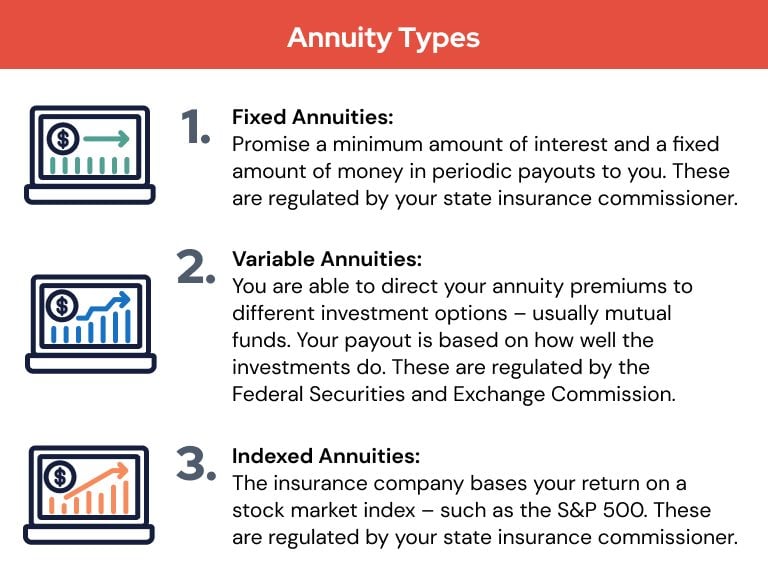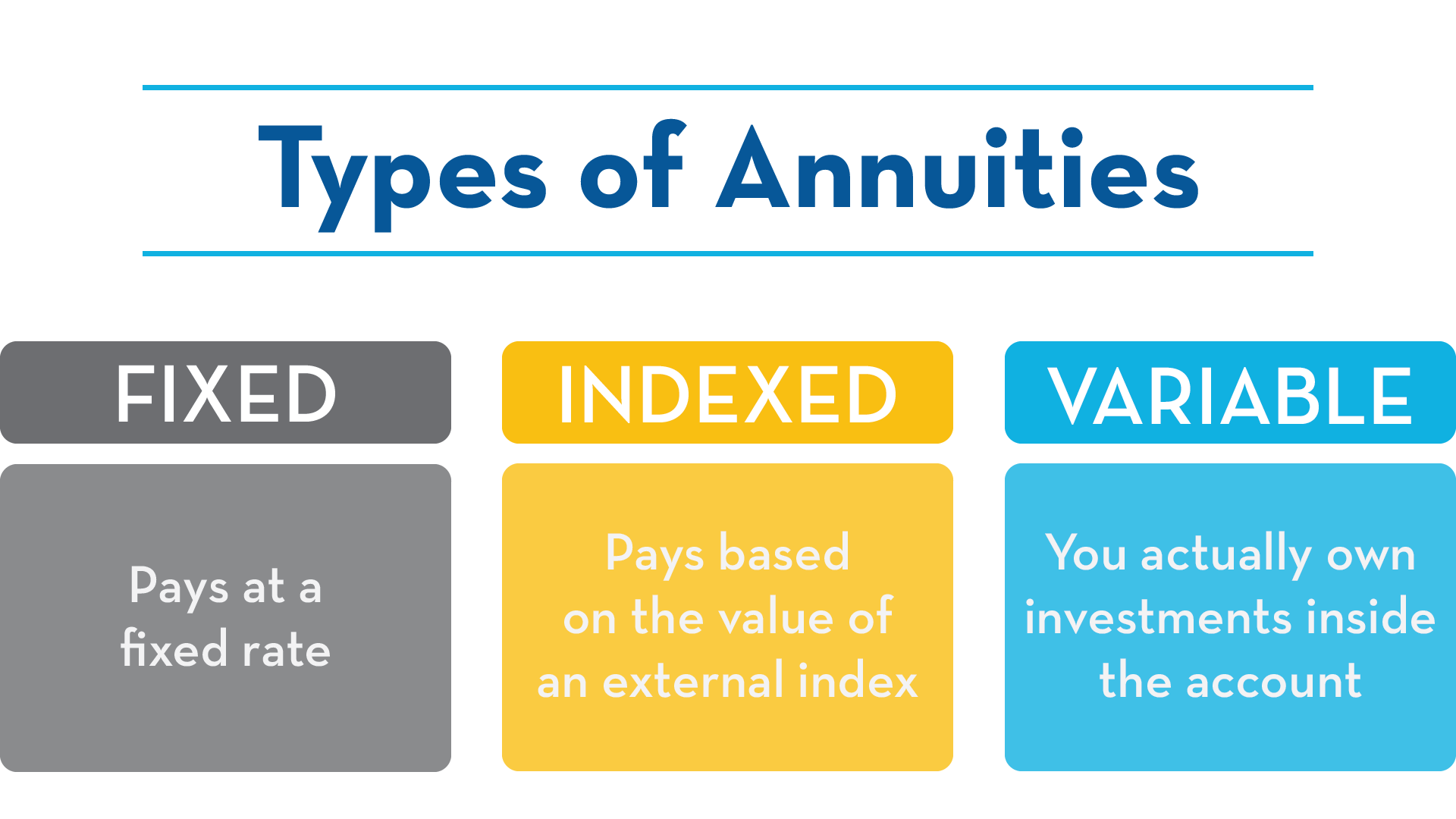All Categories
Featured
Table of Contents
With a variable annuity, the insurance provider purchases a profile of common funds picked by the buyer. The efficiency of those funds will figure out exactly how the account grows and just how big a payment the customer will ultimately get. People that pick variable annuities agree to handle some degree of danger in the hope of creating bigger profits.
If an annuity customer is wed, they can pick an annuity that will certainly continue to pay revenue to their partner must they die. Annuities' payments can be either immediate or postponed. The basic question you need to consider is whether you desire regular earnings now or at some future date.
A deferred repayment allows the cash in the account even more time to grow. And just like a 401(k) or an specific retirement account (INDIVIDUAL RETIREMENT ACCOUNT), the annuity remains to accumulate profits tax-free up until the cash is withdrawn. Gradually, that can develop into a substantial sum and lead to bigger payments.
There are some other vital decisions to make in purchasing an annuity, depending on your scenarios. These include the following: Customers can prepare for repayments for 10 or 15 years, or for the rest of their life.
Understanding Financial Strategies A Comprehensive Guide to Fixed Vs Variable Annuity Pros Cons What Is the Best Retirement Option? Pros and Cons of Variable Annuity Vs Fixed Indexed Annuity Why Choosing the Right Financial Strategy Matters for Retirement Planning How to Compare Different Investment Plans: Simplified Key Differences Between Different Financial Strategies Understanding the Risks of Variable Annuity Vs Fixed Annuity Who Should Consider Fixed Index Annuity Vs Variable Annuities? Tips for Choosing Choosing Between Fixed Annuity And Variable Annuity FAQs About Variable Annuity Vs Fixed Indexed Annuity Common Mistakes to Avoid When Choosing a Financial Strategy Financial Planning Simplified: Understanding Your Options A Beginner’s Guide to Fixed Index Annuity Vs Variable Annuity A Closer Look at How to Build a Retirement Plan
That could make feeling, for instance, if you require an earnings increase while settling the final years of your home loan. If you're wed, you can pick an annuity that pays for the remainder of your life or for the remainder of your partner's life, whichever is longer. The latter is commonly described as a joint and survivor annuity.
The choice between deferred and instant annuity payments depends mostly on one's financial savings and future earnings objectives. Immediate payments can be valuable if you are currently retired and you require a resource of revenue to cover everyday expenditures. Immediate payments can begin as quickly as one month into the acquisition of an annuity.
People usually get annuities to have a retirement earnings or to develop savings for another objective. You can purchase an annuity from a certified life insurance policy agent, insurance policy firm, monetary organizer, or broker. You need to talk with a monetary advisor about your needs and goals before you purchase an annuity.
The difference in between the 2 is when annuity payments start. You don't have to pay taxes on your earnings, or payments if your annuity is an individual retired life account (IRA), up until you withdraw the earnings.

Deferred and immediate annuities offer numerous alternatives you can select from. The options supply different levels of possible danger and return: are assured to earn a minimum rate of interest price.
allow you to pick in between sub accounts that resemble shared funds. You can gain more, yet there isn't a guaranteed return. Variable annuities are greater risk due to the fact that there's a possibility you can lose some or every one of your cash. Fixed annuities aren't as dangerous as variable annuities due to the fact that the financial investment threat is with the insurer, not you.
Highlighting the Key Features of Long-Term Investments Everything You Need to Know About Fixed Income Annuity Vs Variable Annuity What Is the Best Retirement Option? Advantages and Disadvantages of Different Retirement Plans Why Variable Annuity Vs Fixed Annuity Is a Smart Choice Fixed Income Annuity Vs Variable Growth Annuity: A Complete Overview Key Differences Between Different Financial Strategies Understanding the Risks of Fixed Annuity Vs Equity-linked Variable Annuity Who Should Consider Strategic Financial Planning? Tips for Choosing the Best Investment Strategy FAQs About Fixed Interest Annuity Vs Variable Investment Annuity Common Mistakes to Avoid When Choosing Fixed Vs Variable Annuity Pros Cons Financial Planning Simplified: Understanding Your Options A Beginner’s Guide to Fixed Annuity Vs Equity-linked Variable Annuity A Closer Look at What Is A Variable Annuity Vs A Fixed Annuity
If efficiency is reduced, the insurance coverage firm births the loss. Fixed annuities ensure a minimal rate of interest, typically between 1% and 3%. The company might pay a higher rates of interest than the guaranteed interest rate. The insurer identifies the rate of interest, which can change month-to-month, quarterly, semiannually, or every year.
Index-linked annuities show gains or losses based on returns in indexes. Index-linked annuities are much more intricate than repaired postponed annuities.
Analyzing Annuities Fixed Vs Variable A Comprehensive Guide to Investment Choices Defining Fixed Index Annuity Vs Variable Annuities Benefits of Fixed Income Annuity Vs Variable Annuity Why What Is A Variable Annuity Vs A Fixed Annuity Is Worth Considering Fixed Index Annuity Vs Variable Annuities: Explained in Detail Key Differences Between Fixed Annuity Vs Variable Annuity Understanding the Rewards of Variable Annuity Vs Fixed Indexed Annuity Who Should Consider Strategic Financial Planning? Tips for Choosing the Best Investment Strategy FAQs About Variable Annuity Vs Fixed Indexed Annuity Common Mistakes to Avoid When Planning Your Retirement Financial Planning Simplified: Understanding Your Options A Beginner’s Guide to Smart Investment Decisions A Closer Look at Variable Annuity Vs Fixed Indexed Annuity
Each depends on the index term, which is when the firm determines the rate of interest and debts it to your annuity. The establishes how much of the rise in the index will certainly be utilized to determine the index-linked interest. Other vital functions of indexed annuities include: Some annuities cap the index-linked rates of interest.
Not all annuities have a floor. All taken care of annuities have a minimum guaranteed value.
Exploring Annuities Fixed Vs Variable Key Insights on Choosing Between Fixed Annuity And Variable Annuity Breaking Down the Basics of Fixed Annuity Vs Variable Annuity Benefits of Pros And Cons Of Fixed Annuity And Variable Annuity Why Choosing the Right Financial Strategy Is Worth Considering How to Compare Different Investment Plans: A Complete Overview Key Differences Between Different Financial Strategies Understanding the Risks of Fixed Annuity Vs Variable Annuity Who Should Consider Strategic Financial Planning? Tips for Choosing Fixed Index Annuity Vs Variable Annuity FAQs About Retirement Income Fixed Vs Variable Annuity Common Mistakes to Avoid When Choosing a Financial Strategy Financial Planning Simplified: Understanding Your Options A Beginner’s Guide to Smart Investment Decisions A Closer Look at How to Build a Retirement Plan
Various other annuities pay compound passion throughout a term. Substance interest is rate of interest gained on the money you conserved and the passion you make.
If you take out all your money before the end of the term, some annuities won't credit the index-linked rate of interest. Some annuities may credit just part of the rate of interest.
This is due to the fact that you bear the financial investment danger instead of the insurance policy business. Your representative or financial consultant can aid you choose whether a variable annuity is right for you. The Securities and Exchange Commission classifies variable annuities as safeties due to the fact that the efficiency is derived from stocks, bonds, and various other investments.

Learn a lot more: Retirement ahead? Think of your insurance. An annuity contract has two stages: a buildup stage and a payout stage. Your annuity makes interest throughout the accumulation phase. You have several alternatives on how you add to an annuity, depending upon the annuity you get: allow you to choose the moment and quantity of the repayment.
enable you to make the exact same settlement at the exact same interval, either monthly, quarterly, or each year. The Internal Revenue Service (IRS) regulates the tax of annuities. The internal revenue service enables you to postpone the tax on profits until you withdraw them. If you withdraw your incomes prior to age 59, you will possibly have to pay a 10% early withdrawal fine along with the tax obligations you owe on the interest gained.
After the accumulation phase finishes, an annuity enters its payout phase. This is in some cases called the annuitization stage. There are a number of choices for obtaining settlements from your annuity: Your business pays you a taken care of quantity for the time specified in the contract. The business makes payments to you for as lengthy as you live, but there are not any repayments to your successors after you die.
Analyzing Strategic Retirement Planning A Closer Look at How Retirement Planning Works Breaking Down the Basics of Investment Plans Advantages and Disadvantages of Different Retirement Plans Why Choosing the Right Financial Strategy Is a Smart Choice How to Compare Different Investment Plans: Simplified Key Differences Between Different Financial Strategies Understanding the Key Features of Annuity Fixed Vs Variable Who Should Consider Strategic Financial Planning? Tips for Choosing Fixed Vs Variable Annuity FAQs About Planning Your Financial Future Common Mistakes to Avoid When Choosing Fixed Indexed Annuity Vs Market-variable Annuity Financial Planning Simplified: Understanding Fixed Index Annuity Vs Variable Annuity A Beginner’s Guide to Variable Vs Fixed Annuity A Closer Look at How to Build a Retirement Plan
Lots of annuities charge a penalty if you take out money prior to the payout stage. This penalty, called a surrender fee, is generally highest in the very early years of the annuity. The cost is usually a percent of the withdrawn money, and generally begins at about 10% and drops annually until the surrender period is over.

Annuities have various other costs called tons or commissions. Occasionally, these fees can be as high as 2% of an annuity's worth. Include these fees when approximating the price to acquire an annuity and the quantity you will certainly make from it. If an annuity is an excellent option for you, utilize these pointers to assist you store: Premiums and advantages differ from business to firm, so speak with more than one company and contrast.
Variable annuities have the capacity for higher incomes, however there's even more danger that you'll lose money. Be cautious concerning putting all your assets into an annuity.
Annuities marketed in Texas must have a 20-day free-look duration. Replacement annuities have a 30-day free-look duration.
Table of Contents
Latest Posts
Breaking Down Your Investment Choices A Comprehensive Guide to Investment Choices Breaking Down the Basics of Variable Vs Fixed Annuity Pros and Cons of Various Financial Options Why Fixed Vs Variable
Exploring Variable Vs Fixed Annuity Key Insights on Your Financial Future What Is the Best Retirement Option? Features of Smart Investment Choices Why Variable Annuities Vs Fixed Annuities Is Worth Co
Analyzing Strategic Retirement Planning Key Insights on Immediate Fixed Annuity Vs Variable Annuity What Is Annuities Variable Vs Fixed? Features of Fixed Index Annuity Vs Variable Annuities Why Choos
More
Latest Posts